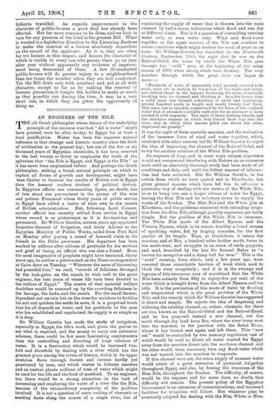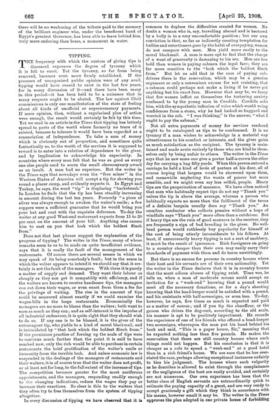AN ENGINEER OF THE NILE.
THE old Greek philosopher whose theory of the underlying principle of the universe was that "Allis water " might have pointed, were he alive to-day, to Egypt for at least a local justification. Water has been the supreme natural influence in that strange and historic country since the birth of civilisation to the present day ; but out of the five or six thousand years of Egyptian chronicles, it has been reserved to the last twenty or thirty to emphasise the truth of the aphorism that "the Nile is Egypt, and Egypt is the Nile" as it has never been emphasised before. And perhaps the Greek philosopher, seeking a broad, natural principle on which to explain all forms of growth and development, might have been likelier to forecast the results of British rule in Egypt than . the keenest modern student of political history. In Egyptian affairs one commanding figure, no doubt, has of late stood out pre-eminent in the person of the wise and patient Proconsul whose thirty years of public service in Egypt have added a lustre of their own to the annals of British administration. But, following Lord Cromer, another official has recently retired from service in Egypt whose record is as picturesque as it is far-reaching and permanent. Sir William Garstin, sixteen years ago appointed Inspector-General of Irrigation, and lately Adviser to the Egyptian Ministry of Public Works, sailed from Port Said on Monday after paying a round of farewell visits to his friends in the Delta provinces. His departure has been marked by address after address of gratitude for his services and grief at losing an official who was also a friend. Even the most imaginative of prophets might have hesitated, thirty years ago, to outline a picture such as the Times correspondent at Cairo drew on Tuesday. "Wherever the news of his coming had preceded him," we read, "crowds of fellaheen thronged by the lock-gates on the canals to wish well to the great engineer, the best years of whose life have been devoted to the welfare of Egypt." The source of that material welfare doubtless would be summed up by the crowding fellaheen in the barrage, the locks, and the canals. For the small farmer, dependent not on rain but on the river for moisture to fertilise his soil and quicken the seeds he sows, it is a perpetual truth that his all depends on water, and his gratitude to the man who has established and regularised its supply is as simple as it is deep.
Sir William Garstin has made the study of irrigation, especially in Egypt, his life's work, and, given the genius to see what is required, and the money to carry out extensive schemes, there could be few more fascinating employments than the controlling and directing of huge volumes of water. It is a fascination which would be increased two- fold and threefold by dealing with a river which has the greatest place among the rivers of history, which in its upper stretches flows through forests and ravines hardly yet penetrated by man, and which wastes in hideous marshes and on useless plants millions of tons of water which might be used for the life and the food of mankind. To an engineer, too, there would be a strong attraction in the task of harnessing and employing the water of a river like the Nile, because of the extraordinary complexity of the problem involved. It is not a question of mere cutting of channels or erecting dams along the course of a single river, but of regulating the supply of water that is thrown into the main channel by half-a-dozen tributaries which flood and run dry at different times. Nor is it a question of controlling running water only, or even water only. Wind and flood-water together on the upper reaches of the Nile can combine to create conditions which might destroy the work of years in an
hour. Sir William Garstin has described (in the Nineteenth Century, September, 1905) the sight that he saw on the Bahr-el-Gebel, the name by which the White Nile goes
through the " sudd " area, at the beginning of the rainy season of 1900, when strong winds were blowing. The very marshes through which the great river ran began to move :-
"Hundreds of acres of apparently solid ground, covered with reeds, were set in motion by the action of the winds and water, and drifted about in the lagoons bordering the river, eventually breaking into its channel and blocking it. In a few hours time a solid mass was formed, consisting of earth and vegetation, several hundred yards in length and nearly twenty feet thick. This mass was so speedily compressed by the force of the confined water that it attained a solidity sufficient for an elephant to have crossed it with impunity. The sight of these drifting islands, and the resistless manner in which they forced their way into the river, and in which their masses piled one above the other, impressed me greatly."
It was the sight of these unstable marshes, and the realisation of the immense force of wind and water together, which, combined with other reasons, led Sir William Garstin to reject the idea of improving the channel of the Bahr-el-Gebel, and to try for another solution of the White Nile problem.
An engineer of long, and in some ways unique, experience would not recommend interfering with Nature on an extensive scale until an absolutely thorough study had been made of all conditions and data, and until the fullest amount of informa- tion had been collected. But Sir William Garstin, in the article from which we have quoted and in Blue-books, has given general reasons which have led him to advocate a particular way of dealing with the waters of the White Nile, so as to bring into use a larger volume of water for Egypt, leaving the Blue Nile and its tributary rivers to supply the wants of the Soudan. The Blue Nile and the White join at Khartoum, and the problems connected with extending irriga- tion from the Blue Nile, although possibly expensive, are fairly - simple. But the problem of the White Nile is immense.
The White Nile north of the Albert Nyanza and the Victoria Nyanza, which is its source, tumbles a broad stream of sparkling water, fed by leaping cascades, for the first quarter of its length. Then, at Gondokoro, it enters the marshes, and at Bor, a hundred miles further north, turns to the north-west, and struggles in an ocean of reeds, papyrus, and mud, described by the late Sir Samuel Baker as "a heaven for mosquitos and a damp hell for men." This is the " sudd" country, from which, only a few years ago, were removed those remarkable barriers of weed which used to block the river completely ; and it is in the swamps and lagoons of this enormous area of marshland that the White Nile loses actually from fifty to eighty-five per cent, of the water which is brought down from the Albert Nyanza and the hills. It is the prevention of this waste of water by flooding and evaporation which is the great problem of the White Nile, and the remedy which Sir William Garstin has suggested is direct and simple. He rejects the idea of deepening and widening the existing channel, or, rather, channels, for there are two, known as the Bahr-el-Gebel and the Bahr-el-Zaraf, and he has proposed instead a new channel, cut due north through dry land from Bor, where the river turn, west into the marshes, to the junction with the Sobat River, where it has turned east again and left them. This "new cut" would be controlled by two masonry regulators, one of which would be used to divert all water wanted for Egypt away from the marshes direct into the northern channel, and the other would, when necessary, turn any flood-water which was not wanted into the marshes to evaporate.
If this channel were cut, the extra supply of summer water
would admit of a great extension of perennial irrigation throughout Egypt, and also, by freeing the resources of the Blue Nile, throughout the Soudan. The difficulty, of course, would be the expense, and for some time, no doubt, that
difficulty will remain. . The present policy of the Egyptian Government is an extension of communications, and increased facilities for irrigation will follow. But whatever plan be eventually adopted for dealing with the Nile, White or Blue. there will be no weakening of the tribute paid to the memory of the brilliant engineer who, under the beneficent band of Egypt's greatest Governor, has been able to leave behind him, truly more enduring than brass, a monument in water.























































 Previous page
Previous page